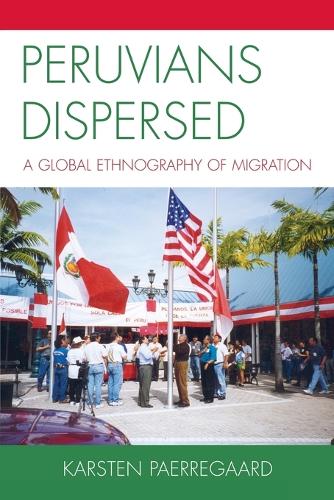
Peruvians Dispersed: A Global Ethnography of Migration
(Paperback)
Publishing Details
Peruvians Dispersed: A Global Ethnography of Migration
By (Author) Karsten Paerregaard
Bloomsbury Publishing PLC
Lexington Books
20th November 2009
United States
Classifications
Tertiary Education
Non Fiction
304.80985
Physical Properties
Paperback
288
Width 154mm, Height 232mm, Spine 21mm
426g
Description
Peruvians Dispersed presents an anthropological study of transnational migration to the United States, Spain, Japan and Argentina. Karsten Paerregaard spent a total of one year living with Peruvian migrants in four continents which allowed him to make ethnographic in-depth descriptions of Peru's many migrant communities and at the same time discuss how immigration and labor market policies in the Global North both thwart and spur migration from the Global South. The book also offers an innovative contribution to the methodological debate about multi-sited field research, which in recent years has become prominent among scholars studying processes of globalization, transnationalism and multiculturalism. Because of the wide span of social groups in Peru that migrate and the global dispersion of Peruvians in America, Asia and Europe; the study of the Peruvian migration offers a unique opportunity to rethink current attempts to theorize transnational and diasporic migration and develop the methodological and analytical framework for a global ethnography.
Reviews
This important book examines transnational migration from Peru to four of the main receiver nations of Peruvian immigrants. . . . The book's strength lies in the many interviews and case histories that Paerregaard has constructed. The interviews range widely across the immigrant landscape, gender, and class. As such they provide the msot careful study of Peruvians abroad yet written. . . . Paerregaard's research is first rate; he structures his discussion clearly, and he understands well the need for placing this book in a proper historical context. * Journal of American Ethnic History *
This rich multi-sited ethnography, and the numerous life-stories it encompasses, provide compelling insights into what Paerregaard refers to as Peruvians' 'life-long struggle to progresar (make progress)', both at home and abroad. Despite power relations that exclude and marginalize them, migrants make use of social networks and sheer existential resourcefulness to improve their lot, albeit at the cost of continuing uncertainty and painful compromise. -- Michael D. Jackson, Distinguished Visiting Professor of World Religions, Harvard Divinity School
Author Bio
Karsten Paerregaard is a fellow at the Woodrow Wilson International Center for Scholars and associate professor of anthropology at the University of Copenhagen.
